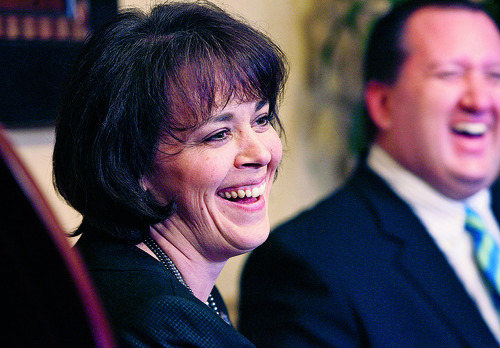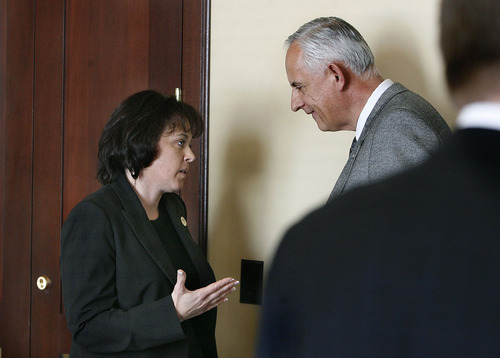This is an archived article that was published on sltrib.com in 2011, and information in the article may be outdated. It is provided only for personal research purposes and may not be reprinted.
Reversing a trend established over the past several years, Utah House Republicans opted to meet almost exclusively in closed-door caucuses this year, arguing that meeting out of the public eye gave them a chance for more candid discussion.
House Speaker Becky Lockhart, R-Provo, who ran on a platform of openness, said that meant letting her House colleagues air their views and be part of decision-making, and that sometimes "requires having that opportunity to voice their feelings about issues in what we would consider a safe place."
Senate Republicans have always held secret caucuses, and this year was no exception. Both House and Senate Democrats hold open caucuses.
"It feels more casual. It feels more accepting of divergent ideas. When they're open, people will come up after … and say 'Here's how I really feel, but I didn't want to say that [publicly],' " said Senate President Michael Waddoups, R-Taylorsville.
Although such meetings might otherwise be required to be held in public — because a quorum of the body is present — legislative caucuses are specifically exempt from the Open and Public Meetings Act.
"They're not subject to the Open Meetings Act, but in the past the Legislature has been very committed to doing the public's business in the public's eye whenever possible," said Linda Petersen, president of the Utah Foundation for Open Government. "This again just reflects on the change in attitude in the Legislature and in the legislative leadership."
Waddoups said the closed meetings allow colleagues to brainstorm and toss out ideas that maybe aren't fully formed and get feedback.
"I don't think there's anything that's being hidden," said House Majority Whip Greg Hughes, R-Draper. "You have a caucus for one reason, and that is to get issues out. Some of them are sensitive."
In the meetings, lawmakers air their views on pending legislation, ideas they are considering and political strategy. The Senate took the opportunity this session to hear from several vendors interested in selling the state educational software.
On at least a handful of issues every session, the legislators vote on "caucus positions," essentially a straw vote on particular legislation. Because the Republicans hold a supermajority in both chambers, the fate of a bill is frequently determined by those closed-door votes.
For example, the Senate spent hours debating the fate of immigration bills in their closed meetings; education reform ideas were batted around for several meetings early in the session; and budget concerns were aired largely in the secretive meetings.
Despite that, Lockhart said the debate that takes place in public still matters and bristled at the suggestion it did not.
"That is absolutely not a show. Our public work is not a show. It is serious. It is real," she said. "As you have witnessed, we have very serious and open debates."
Waddoups said he doesn't expect the Senate to open any of its meetings anytime soon.
"There is absolutely no appetite to do it," he said.
That, said Petersen, should be of concern to citizens.
"Even if it's just perception, there is a perception that, if they close their meetings, what are they hiding?" she said. —
Utah Public and Open Meetings Act
The law requires that any executive, legislative, administrative or advisory body of the state or local governments is a public body that, when it meets with a quorum, must serve advance public notice of the meeting, record it and allow any member of the public to attend. There are a few specific exemptions for discussions of such things as strategy sessions on litigation or collective bargaining. Excluded from the statute's definition of a public body is a political party, political group, political caucus or conference committee or rules committee of the Legislature.





